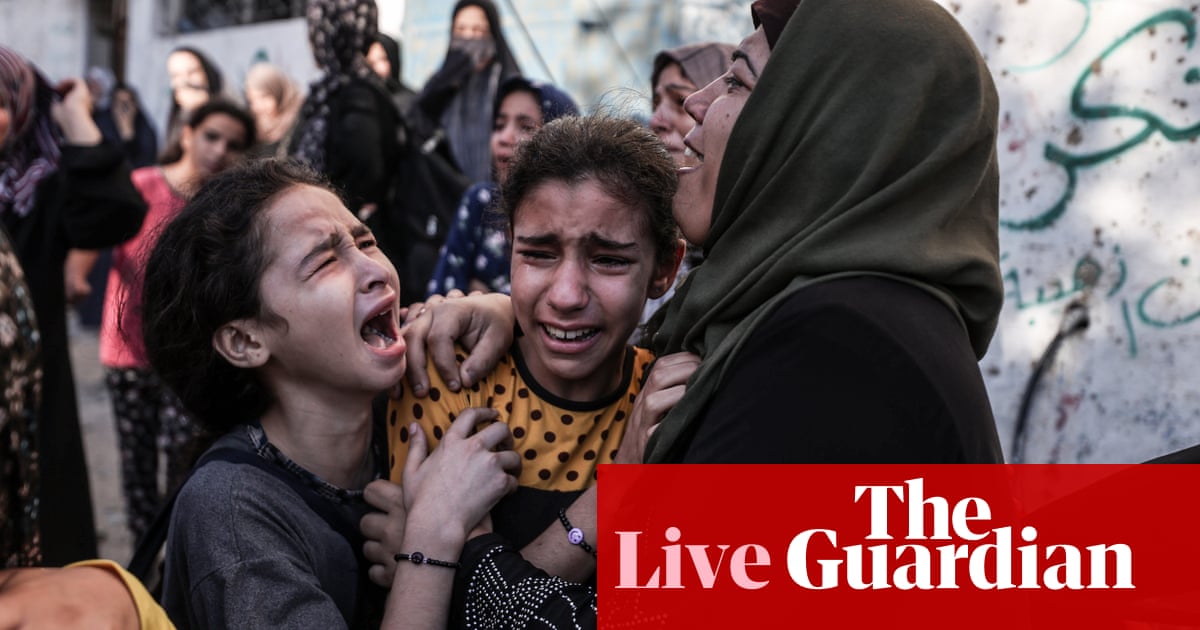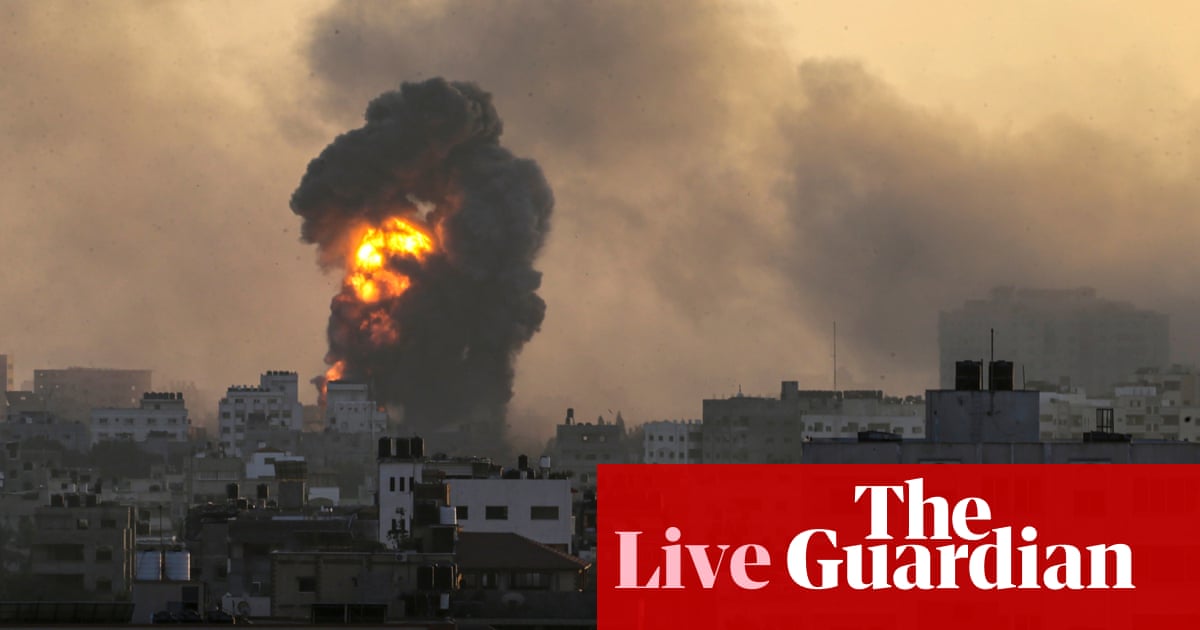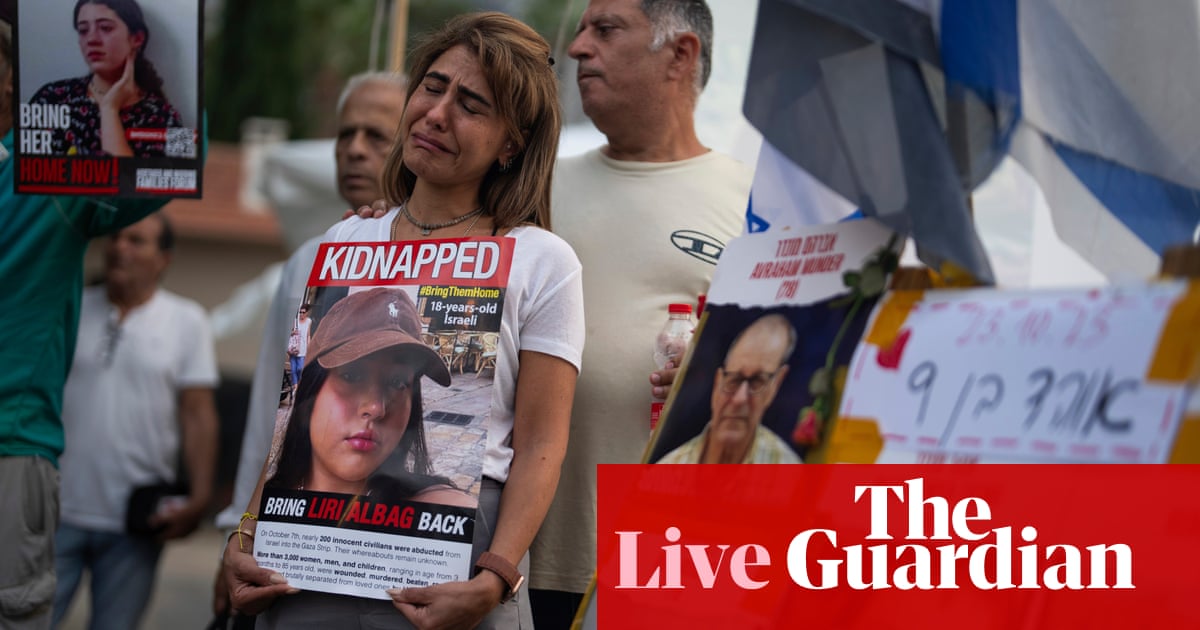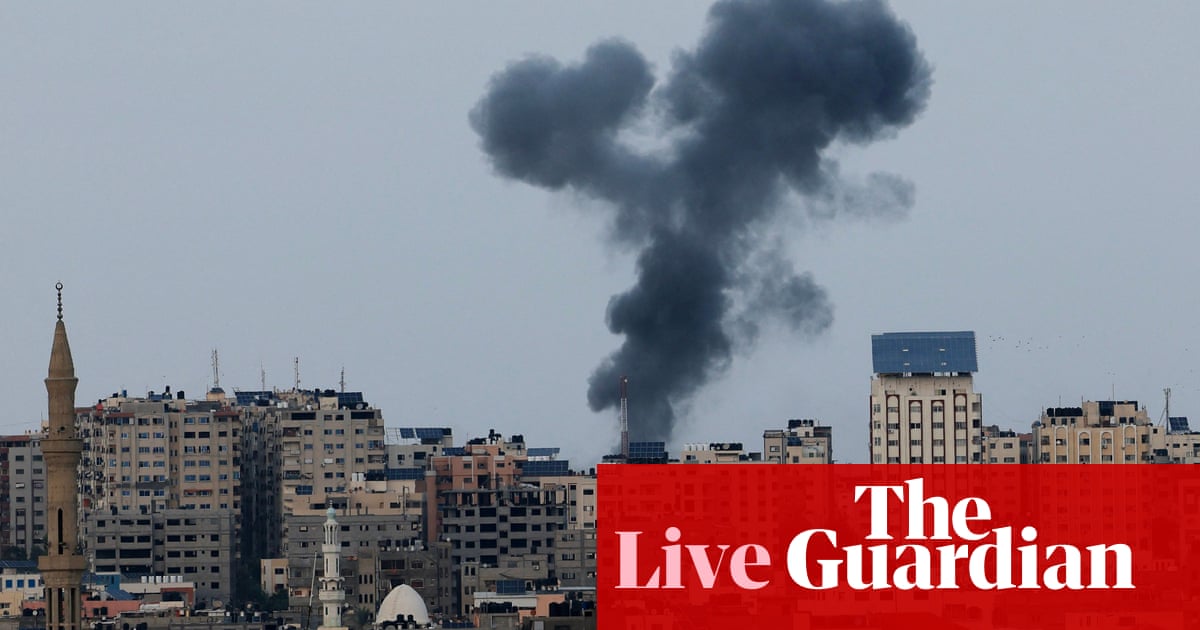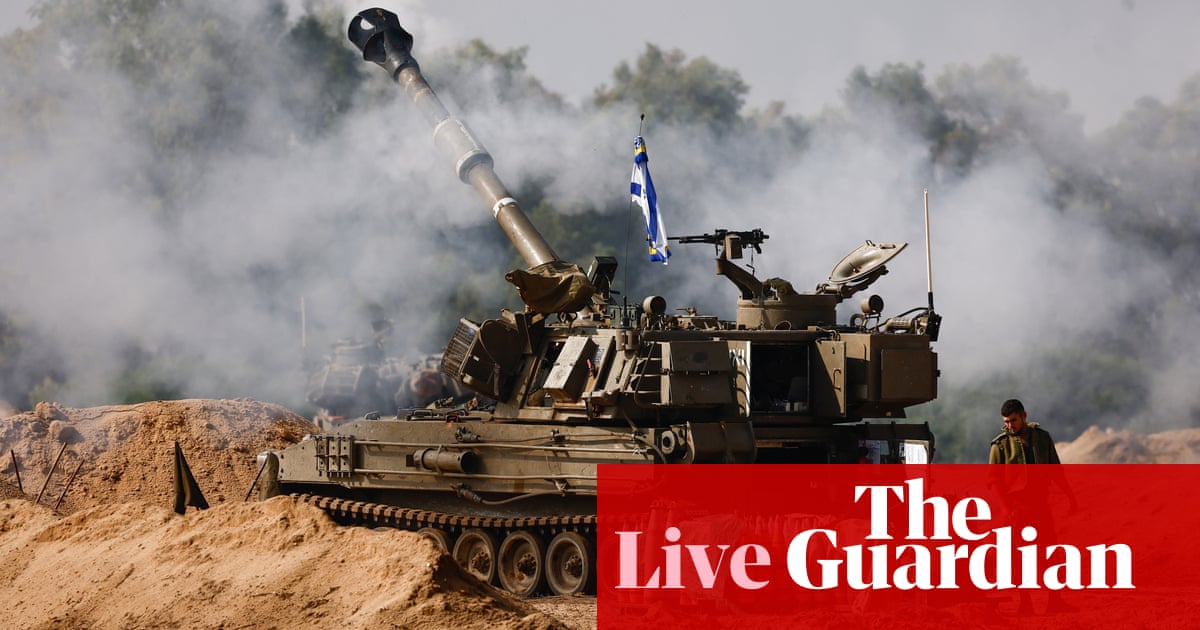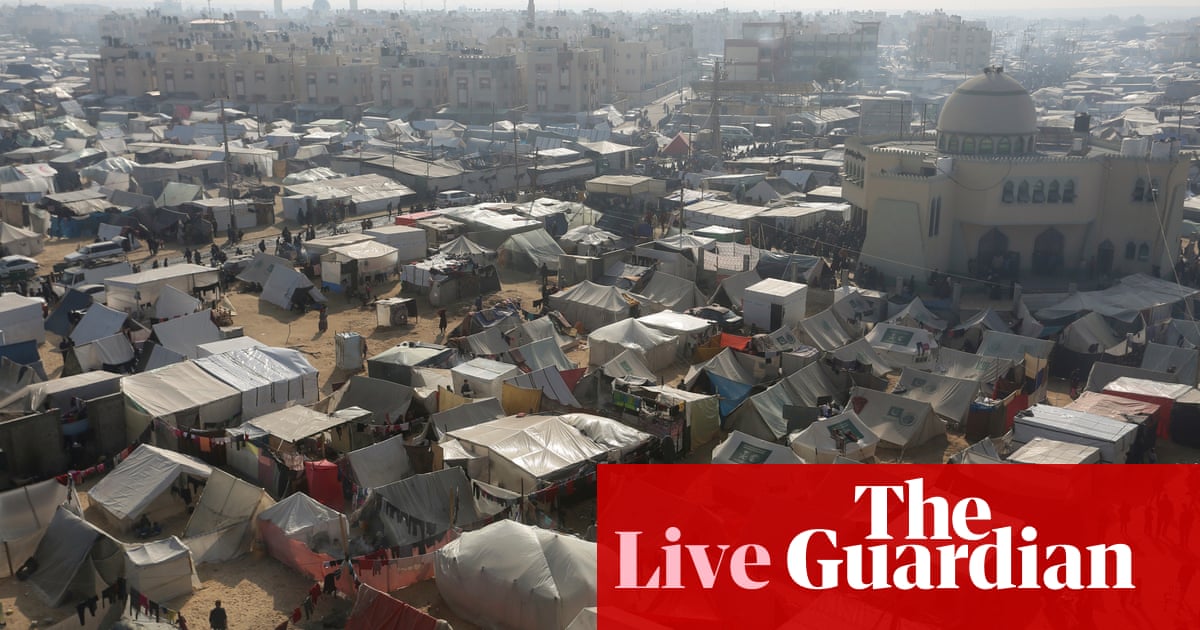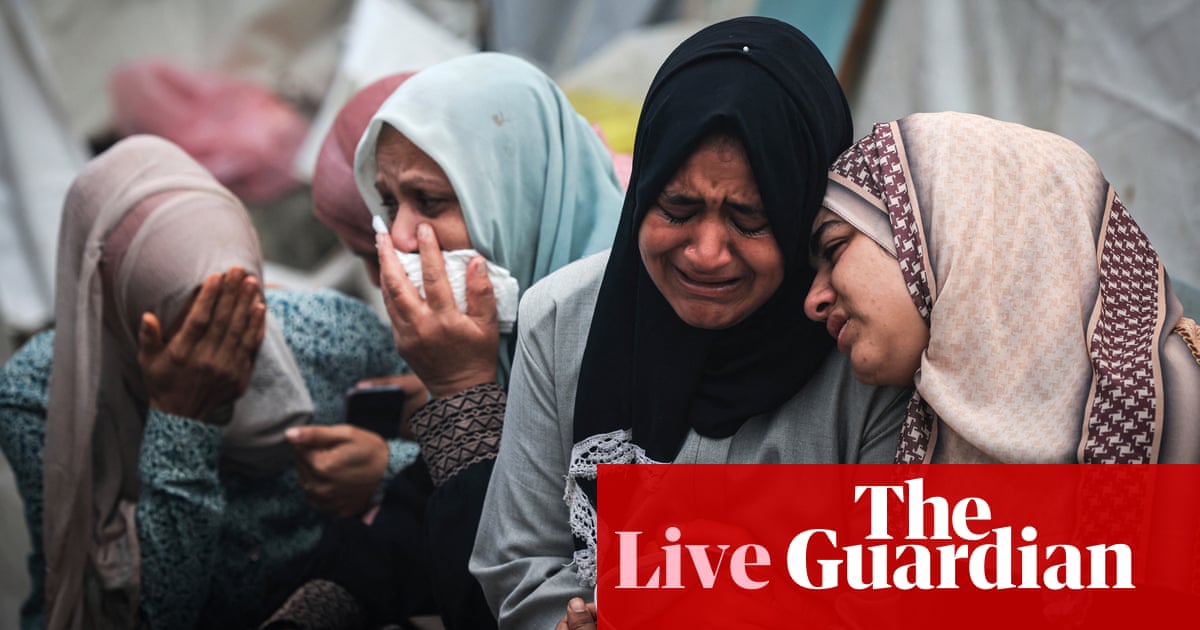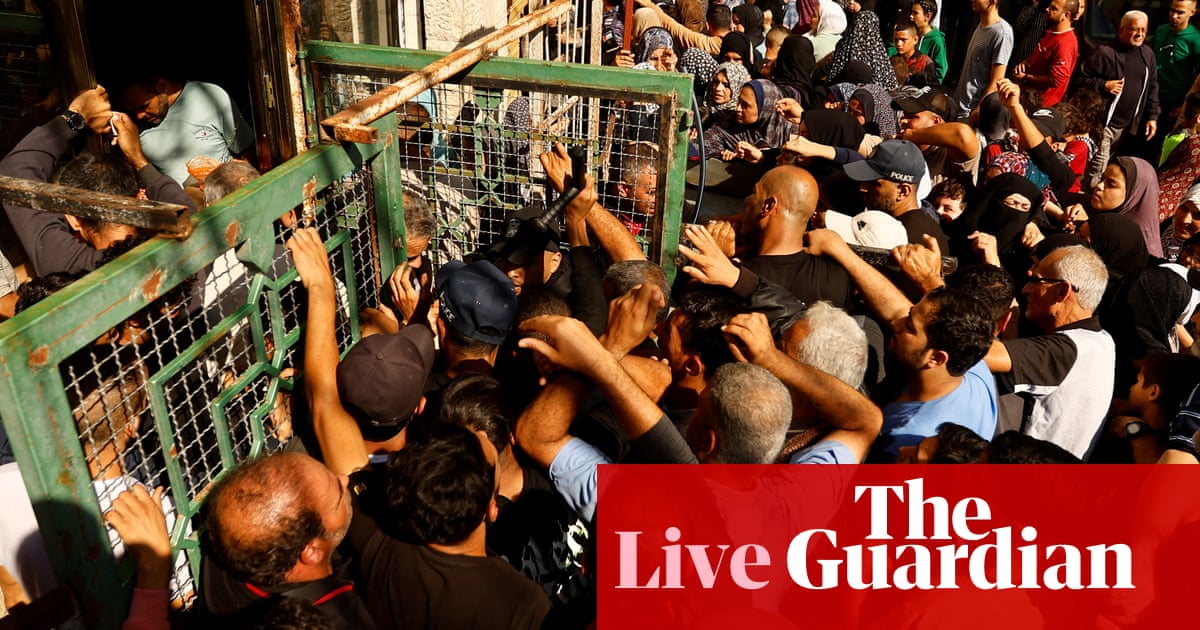
Israeli troops to advance "wherever Hamas exists, including in southern Gaza", says IDF spokesperson
Israeli troops will advance to anywhere Hamas exists, including the southern part of the Gaza Strip, Israel Defense Forces (IDF) spokesperson Daniel Hagari has said.
Hagari, in his regular briefing on Friday, said:
We are determined to advance our operation. It will happen wherever Hamas exists, including in the south of the strip.
It will happen at the time, place and conditions that are best for the military.
The IDF spokesperson’s comments come amid mounting concerns about Israeli plans to expand military operations in parts of the south where people have sought refuge from fighting.
Civilians in parts of south-east Gaza have been told in leaflets dropped by Israeli aircraft to move into a smaller “safe zone” in the coastal town of Mawasi, which covers just 14 sq km (5.4 sq miles).
Death toll from Hamas attack on Israeli music festival rises to 364
An Israeli police investigation into the Hamas attacks at a music festival on 7 October have updated the death toll to 364, according to Israeli media reports.
That figure would make up nearly one-third of all of those killed during the onslaught in Israel on 7 October, the Times of Israel reported, citing Channel 12.
Earlier counts had placed the death count from the attack at Supernova music festival in Kibbutz Re’im at 270.
The Israeli police reportedly believe that Hamas did not know about the festival before carrying out the attacks.
The head of the UN agency for Palestinian refugees (UNRWA) met with the World Health Organization (WHO) chief on Friday.
Philippe Lazzarini, commissioner general of UNRWA, said he and WHO director general, Tedros Adhanom Ghebreyesus, discussed the “lack of protection to medical facilities, risk of diseases [and] the humanitarian crisis among people in #Gaza stripped of dignity overnight.”
Posting to social media, he added:
We call for a ceasefire & we are committed to deliver assistance to Palestinians in need wherever they are.
Israeli troops to advance "wherever Hamas exists, including in southern Gaza", says IDF spokesperson
Israeli troops will advance to anywhere Hamas exists, including the southern part of the Gaza Strip, Israel Defense Forces (IDF) spokesperson Daniel Hagari has said.
Hagari, in his regular briefing on Friday, said:
We are determined to advance our operation. It will happen wherever Hamas exists, including in the south of the strip.
It will happen at the time, place and conditions that are best for the military.
The IDF spokesperson’s comments come amid mounting concerns about Israeli plans to expand military operations in parts of the south where people have sought refuge from fighting.
Civilians in parts of south-east Gaza have been told in leaflets dropped by Israeli aircraft to move into a smaller “safe zone” in the coastal town of Mawasi, which covers just 14 sq km (5.4 sq miles).
The deputy head of Israel’s legislature has criticised the decision to allow a limited amount of fuel into Gaza for humanitarian needs, and said Israel should “burn Gaza now”.
Nissim Vaturi, deputy speaker of the Knesset and a member of the ruling Likud party, said Israel is being “too humane” in a post on social media on Friday, adding:
Burn Gaza now no less! Don’t allow fuel in, don’t allow water in until the hostages are returned back!
His post as Israel war cabinet agreed on Friday to allow 140,000 litres (36,985 gallons) of fuel into Gaza every two days amid acute shortages that threatened aid deliveries and communications in the besieged Palestinian enclave.
Phone and internet services partially restored in Gaza, say telecoms firms
Gaza’s main telecommunications companies Paltel and Jawwal have confirmed the “partial restoration” of telecom services in various parts of Gaza.
The firms announced a complete blackout of their services yesterday due to a lack of fuel. The partial restoration comes after a limited quantity of fuel was provided through the UN agency for Palestinian refugees (UNRWA), they said.
The UK education secretary has expressed “deep concern” that some children are missing lessons to join protests backing a ceasefire in Gaza, with hundreds estimated to have joined school strikes on Friday.
Gillian Keegan said schools should treat the wave of absences “with the utmost seriousness”, despite strike organisers circulating messages suggesting parents would not be fined if children missed school for short or one-off instances.
The school strikes have been called by the Stop the War Coalition, which tweeted pictures saying hundreds of children had joined protests outside town halls in Glasgow, and in the London boroughs of Redbridge and Newham.
Using the hashtag SchoolStrikeForPalestine, students also staged walkouts in Manchester, Luton, Bristol, and the London boroughs of Tower Hamlets and Harrow.
More school strikes are expected next week, and the weekly national marches in London have this weekend been changed to local action by protesters supporting Palestine and calling for a ceasefire in Gaza.
MSF says "terrified" staff and families trapped for six days near al-Shifa hospital
Doctors Without Borders (MSF) said it has been trying to evacuate some of its staff and their families currently trapped inside the organisation’s facilities near al-Shifa hospital in Gaza City.
Since last Saturday, MSF staff and families – 137 people, 65 of them children – have not been able to go outside because of ongoing fighting, it said in a statement on Friday.
The charity said bullets were fired into its guesthouse on Tuesday, and the office building was hit by shrapnel and the guesthouse’s water tank was shelled on Thursday.
Staff have reported high-intensity fighting “getting very close to them”, it said, adding that thousands of civilians trapped in hospitals and other places in Gaza City “suffer the same fate” and are “at risk of dying in the coming days, if not hours”.
Ann Taylor, MSF’s head of mission in Palestine, said:
Our colleagues hear the constant sounds of gunfire, shelling, and drones. We can hear it when we speak with them on the phone. The evacuation route to southern Gaza remains unsafe. They are terrified, they ran out of food several days ago, and children have now started getting sick from drinking salty water. They must be evacuated now.
Here are some of the latest images over the newswires from Gaza.
Five countries ask ICC to investigate situation in Palestine
Five countries have submitted a referral to the international criminal court (ICC) for an investigation of “the situation in the state of Palestine”, ICC chief prosecutor Karim Khan said.
South Africa, Bangladesh, Bolivia, Comoros and Djibouti – all ICC members – have submitted a referral which his office received on Friday, he said in a statement.
Khan confirmed his office was already conducting an investigation into the situation in the state of Palestine which began in March 2021 and encompasses any crimes that may have been committed since June 2014 and Gaza and the West Bank.
That investigation now “extends to the escalation of hostilities and violence since the attacks that took place on October, 2023”.
Khan, who recently visited the Rafah crossing between Gaza and Egypt, said his team had collected a “significant volume” of evidence on “relevant incidents” in the war, adding:
I will also continue my efforts to visit the State of Palestine and Israel in order to meet with survivors, hear from civil society organisations and engage with relevant national counterparts.
UN agency says work in Gaza has become "mission impossible"
An official at the UN agency for Palestinian refugees (UNRWA) has said that the work of the agency in Gaza has become “mission impossible”.
Natalie Boucly, acting deputy commissioner-general, said on Friday that no part of the Gaza Strip has been spared from the bombardment. She said:
Hospitals, mosques, churches, bakeries, and over 60 UNRWA buildings and schools have been hit across Gaza.
Most of UNRWA’s impacted facilities were in the middle areas and in the south of Gaza, she said, noting that this was where people were told to go for safety.
She added that those people had come to UNRWA buildings “to be protected by the UN flag” but the work of the agency has become “mission impossible”, adding:
We cannot fully protect people in UN premises, under the UN flag. We cannot reach people in need, including thousands still trapped in the north. We cannot provide sufficient assistance to those we can reach.
Labour MPs have voiced concern about their safety and condemned the “vile abuse” against them and their staff as pro-Palestine protesters targeted their offices after criticism of the party’s stance on the Israel-Hamas war.
More than 100 pro-Palestine events are due to take place across the UK this weekend, but there will be no large-scale national march in London.
Campaigners are also planning a series of marches on the offices of Labour MPs who failed to vote for a Scottish National party motion on Wednesday calling for a ceasefire, including one at the constituency office of Keir Starmer.
Dozens of activists held protests outside the offices of the London Labour MPs Vicky Foxcroft and Meg Hillier on Friday, a day after hundreds gathered outside the east London office of Rushanara Ali.
Lucy Powell, the shadow leader of the House of Commons, called for social media companies to “do more to stop the whipping up of hate and misinformation”.
Several have contacted police for help in bolstering security, while the chair of the Women’s Parliamentary Labour party (WPLP) said she had called a meeting for Tuesday to assess the extent of the threat and offer reassurance where possible. Siobhan McDonagh, chair of the WPLP, said:
When we are in an atmosphere where two MPs have died in recent years, then people do have reasonable concerns about their safety and the strength of our democratic system.
On Friday the office of the shadow Welsh secretary, Jo Stevens, was daubed with red paint by protesters who also attached posters saying she had “blood on your hands”, something she said was “designed to cause fear and harassment”.
Israeli forces say they are still carefully exploring the Dar al-Shifa hospital site.
The video presentation of al-Shifa did show the main facilities lay deep underground, and it is quite possible the Israeli soldiers have not reached them yet, so there could be much more to come. But the attempt to present what has been found so far as significant is bound to fuel scepticism about whatever is presented later.
There are questions over how much of its graphic presentation of the network under al-Shifa was based on what Israel knew already; its own architect had built an extensive basement area there the last time Israel directly occupied Gaza, up to 2005.
All of this is significant under the Geneva conventions, which forbid military operations against hospitals unless “they are used to commit, outside their humanitarian duties, acts harmful to the enemy”. This exception, spelled out in article 19 of the fourth Geneva convention, states specifically:
… the presence of small arms and ammunition taken from such combatants and not yet handed to the proper service, shall not be considered to be acts harmful to the enemy.
Israel ratified the Geneva conventions in 1951 and claims to observe the principle of proportionality under international humanitarian law, in which the direct military advantage anticipated from a military operation outweighs the civilian harm that can reasonably be anticipated as a consequence. Its observance of those principles is what is in question.
IDF evidence so far falls well short of al-Shifa hospital being Hamas HQ
Before their capture of Dar al-Shifa hospital, the Israel Defense Forces went to great lengths to depict the medical complex as a headquarters for Hamas, from where its attacks on Israel were planned.
The evidence produced so far falls well short of that. IDF videos have shown only modest collections of small arms, mostly assault rifles, recovered from the extensive medical complex. That suggests an armed presence, but not the sort of elaborate nerve centre depicted in animated graphics presented to the media before al-Shifa was seized, portraying a network of well-equipped subterranean chambers.
Even the videos produced so far have raised questions under scrutiny. A BBC analysis found the footage of an IDF spokesperson showing the apparent discovery of a bag containing a gun behind an MRI scanning machine, had been taped hours before the arrival of the journalists to whom he was supposedly showing it.
In a video shown later, the number of guns in the bag had doubled. The IDF claimed its video of what it found at the hospital was unedited, filmed in a single take, but the BBC analysis found it had been edited.
The Vatican has confirmed that Pope Francis will meet next week with relatives of hostages held by Hamas militants in Gaza.
The pope will separately meet with a delegation of Palestinians with family members in Gaza, Vatican spokesperson Matteo Bruni said.
The meetings will be held on Wednesday in the Vatican. Bruni added:
With these meetings, which are of an exclusively humanitarian character, Pope Francis wants to show his spiritual closeness to the sufferings of both.
Israel: "No limitation" on humanitarian aid in Gaza
Israel promised on Friday there would be “no limitation” on aid requested for Gaza by the United Nations, an apparent concession to international pressure and warnings that its iron grip on the war-torn Palestinian territory will lead to starvation and disease.
Earlier Friday, Israel’s national security adviser, Tzachi Hanegbi, said the country’s war cabinet had agreed to allow two tanker trucks of fuel to enter the Gaza Strip each day – a quantity he said was “very minimal” and allowed for only a communications system and water and sewage services.
At a media briefing later in the day, however, Israel appeared to be loosening its position, a defense ministry official pledging: “Every list we get from the UN will be delivered”.
Col Elad Goren of the ministry’s Coordination of Government Activities in the Territories (Cogat) department, did not specifically mention fuel, or that Israel would allow more than two tankers in a day.
But he spoke of plans to increase aid more broadly, including setting up field hospitals to treat wounded Gazans:
We will increase the capacity of the humanitarian convoys and trucks as long as there is a need. Every list that we get from the UN will be delivered. We will check it and it will enter Gaza, so it’s up to the UN to give us those lists.
And if there is a need for 400 trucks, tomorrow there will be 400 trucks. We are not limiting this issue. There is no limitation.
According to Reuters, Israel has promised to allow in aid in the past, but notes Goren’s remarks appeared to signal a shift in tone after UN agencies warned that humanitarian conditions for 2.3 millions Gazans were rapidly deteriorating.
Joe Biden, the US president, discussed the need for more humanitarian aid in Gaza in a phone call Friday lunchtime with Amir Sheikh Tamim Bin Hamad Al-Thani of Qatar, according to a statement from the White House:
The two leaders discussed the urgent need for all hostages held by Hamas to be released without further delay. The leaders also discussed ongoing efforts to increase the flow of urgently needed humanitarian assistance into Gaza and Israel’s decision to resume fuel deliveries for life-saving aid.
The leaders agreed to remain in close touch, including through their teams, on these matters.
Qatar has played a key role in mediation efforts to persuade Hamas to release hundreds of hostages it is holding captive in Gaza, and in urging Israel to allow more aid to reach civilians in the war-torn territory.
Bahrain"s crown prince proposes "hostage trade"
Bahrain’s crown prince says a “hostage trade” between Hamas and Israel could achieve a break in hostilities he believes might end the conflict in Gaza.
Salman bin Hamad Al Khalifa also said security in the region would not realized without a two-state solution, in which he described the US as “indispensable” in achieving, Reuters reports.
He made the comments on Friday in a keynote address to the 2023 Manama Dialogue security summit hosted by the international institute for strategic studies (IISS) in Bahrain, an annual gathering of Middle Eastern foreign ministers and policy makers.
“It is a time for straight talking,” he said, urging Hamas to release Israeli women and children it has held hostage in Gaza since its 7 October attacks.
“The intention is to break so people can take stock, can bury their dead, people can finally start to grieve and maybe people can start to ask themselves about the intelligence failure that led to this crisis in the first place,” he said.
The prince stuck to a largely neutral tone through his speech, calling the situation in Gaza “intolerable” and condemning both Hamas for its attacks and Israel for its massive military response.
Mediation efforts led by fellow Gulf Arab state Qatar for the release of about 240 hostages held by Hamas have so far been unsuccessful. Hamas has released only a handful of captives on what it says is humanitarian grounds.
World Central Kitchen, the international disaster relief charity founded by the celebrity chef José Andrés, says it has trucks packed with food and cooking equipment positioned and ready to aid the humanitarian relief effort in Gaza.
The organization is working in partnership with the non-profit America Near East Refugee Aid (Anera) and says it has a large warehouse outside Cairo to keep a supply chain running.
On Wednesday, Anera announced that it had supervised the first WCK trucks gaining entry to Gaza to supply flour and beans.
The United Nations warns that Gaza’s civilians face the “immediate possibility” of starvation, and that overcrowding and lack of clean water are speeding the spread of diseases as winter approaches.
Deliveries of already scarce food and other supplies have been halted in recent days because of shortages of fuel for trucks and a communications blackout that has made it impossible to coordinate deliveries, aid agencies said.




